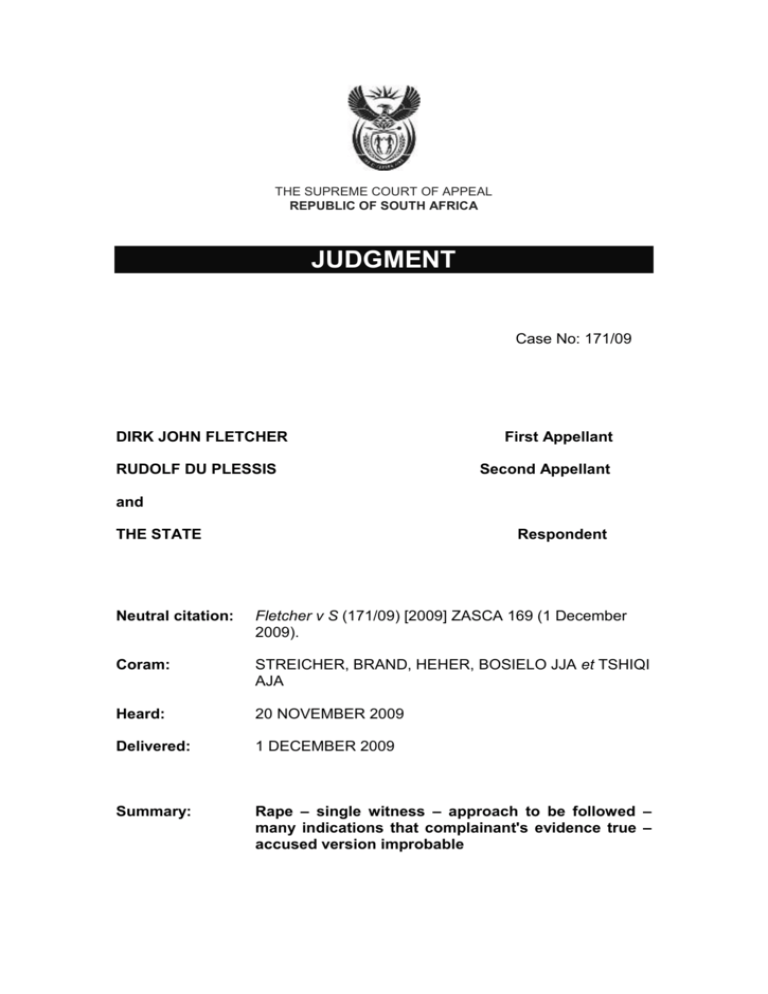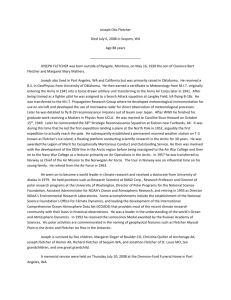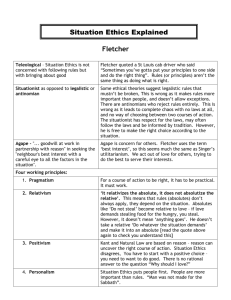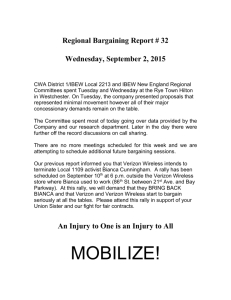1 THE SUPREME COURT OF APPEAL REPUBLIC OF SOUTH
advertisement

THE SUPREME COURT OF APPEAL REPUBLIC OF SOUTH AFRICA JUDGMENT Case No: 171/09 DIRK JOHN FLETCHER RUDOLF DU PLESSIS First Appellant Second Appellant and THE STATE Respondent Neutral citation: Fletcher v S (171/09) [2009] ZASCA 169 (1 December 2009). Coram: STREICHER, BRAND, HEHER, BOSIELO JJA et TSHIQI AJA Heard: 20 NOVEMBER 2009 Delivered: 1 DECEMBER 2009 Summary: Rape – single witness – approach to be followed – many indications that complainant's evidence true – accused version improbable 2 ______________________________________________________________ ORDER ______________________________________________________________ On appeal from: High Court, Johannesburg (Joffe and Mokgoatlheng JJ sitting as a court of appeal from the regional magistrate's court). The appeal is dismissed. _____________________________________________________________ JUDGMENT ______________________________________________________________ TSHIQI AJA (STREICHER, BRAND, HEHER, BOSIELO JJA concurring): [1] The two appellants appeared together with Mr F de Kock before the regional magistrate in Randburg on a charge of rape. There were also other charges but they are no longer of relevance on appeal. In support of the rape charge the State alleged that on 16 January 1998 the three accused had sexual intercourse with the complainant, Bianca, without her consent. All three pleaded not guilty. The two appellants both testified in their defence. De Kock did not. The trial court convicted the first appellant, Mr Fletcher, of rape and sentenced him to twelve years' imprisonment. The second appellant, Mr Du Plessis, was acquitted on the rape charge but convicted as an accomplice to the rape by Fletcher for which he was sentenced to six years' imprisonment. De Kock was acquitted on all charges. The appeal by the appellants against their convictions and sentences to the Johannesburg High Court (Joffe and Mokgoatlheng JJ) was unsuccessful. Both appellants then sought and obtained leave from the court a quo to appeal further, again against both their convictions and sentences to this court. Du Plessis's appeal was struck from the roll for non-appearance. This judgment therefore relates to the appeal by Fletcher only. [2] According to Bianca's testimony she was raped by Fletcher – who was assisted by Du Plessis – during the early morning hours of 16 January 1998. 3 This was denied by the two of them. They did not dispute, however, that they were in the company of Bianca at the time. In the main, Bianca's version as to how this occurred is also common cause. According to Bianca she was 24 years old and single at the time. On the evening of 15 January 1998 she accompanied four of her friends to a night club in Rosebank, Johannesburg. When she became separated from her friends, she had a panic attack. She left the club and sat outside crying. Fletcher offered her a lift home in his car which she eventually accepted. As they set out, Fletcher was driving while she occupied the front passenger seat. Du Plessis and De Kock were passengers at the back. [3] Along the way Fletcher did not take the highway as she expected but took a road which was unfamiliar to her. Fletcher's explanation for this is that he wanted to avoid the traffic police as he was intoxicated. Bianca testified that once she realised that Fletcher was using a different route, she became scared and started crying. Bianca and Fletcher contradicted each other on what really happened as Fletcher continued to drive. Fletcher's version suggests that Bianca started behaving irrationally and irritated him whilst he was driving. Bianca's version suggests that she became more agitated as they continued along the way as she feared for her life. However, they agreed that at some stage there was a tussle over her handbag which eventually disappeared through the open window on Fletcher's side. According to Bianca she needed the bag to dial an emergency button on her cell phone which was in the bag. According to Fletcher's version, on the other hand, Bianca continuously hit his arm with her handbag, thereby disturbing his driving. What was, however, common cause between them was that at some stage Bianca tried to jump out of the moving vehicle through Fletcher's window and that she was pulled back inside. Bianca further stated that along the way De Kock touched her on her breast and that Fletcher started masturbating. Fletcher denied that he did that. De Kock, as I said, did not testify. [4] It is common cause that Fletcher then brought the car to a standstill on the side of the road where they were surrounded by open veld. According to 4 Bianca she then opened her door and ran. All three of the men chased her and caught up with her. [5] Bianca testified that after she was pushed to the ground Fletcher pulled down her pants and underwear and then his own trousers and made her lie on her back. He then penetrated her anus. She screamed. He withdrew and penetrated her vagina. Du Plessis was holding her arms when Fletcher was taking off her pants and De Kock was just standing next to them. Her mind went blank for a while. At some stage De Kock told Fletcher it was his turn. She thought Fletcher could have ejaculated because she felt wet. Fletcher moved away from her and De Kock opened the fly of his trousers and climbed on top of her. She could feel his penis on her thigh. He whispered to her and asked her to co-operate with him because he wanted to help her. He told her to pretend she was enjoying herself and she complied. He asked the other two to leave them as they were enjoying themselves. At first they stood on the left-hand side and he again asked them to leave. They climbed into the vehicle and left. She and De Kock ran away from the scene. De Kock lifted her on his shoulders and they ran until they came across the patrol vehicle driven by two security guards. At that time, Bianca testified, she only wore a jacket and a T-shirt. Below the waist she was completely naked. [6] Bianca's version is supported in this regard by the two security guards, Messrs Mbokazi and Sithole. They testified that they were driving a patrol vehicle during the early morning hours of 16 January 1998 when they heard a woman screaming for help near Cedar Road, Fourways. They drove in the direction of where the screams came from and saw De Kock and Bianca standing next to the road. Bianca was completely naked below the waist and she was trying to pull down her leather jacket to cover herself. Bianca and De Kock requested the two security guards to take them to the nearest police station which they then did. [7] Fletcher's version, which was supported in all material respects by the evidence of Du Plessis went as follows: After he brought the vehicle to a standstill, Bianca got out of the car through the driver's window and ran across 5 the road into the veld. He thought of leaving her but they all decided to go and find her. As he was running he fell into a donga. He then saw Bianca on his right-hand side lying on her back. Before he had a chance to say anything she called out to him and said 'please do not do this to me'. He was angry and frustrated and went to her and straddled her with his knees on either side and told her in a harsh manner to relax. He was joined by De Kock and Du Plessis and at that time she relaxed completely. She asked Du Plessis to fetch a cigarette and whilst Du Plessis was gone he and De Kock remained behind. When De Kock nudged him on the shoulder he got up and moved away. Du Plessis came back with the cigarette which Bianca smoked. He noticed that her pants were down to her knees and that she and De Kock were whispering to each other while he lay next to her in what could be described as an intimate position. They then started kissing. De Kock asked Fletcher to leave the two of them alone. Fletcher, on the other hand, insisted that they should all leave together. Bianca then said that she and De Kock were enjoying themselves and asked to be left alone. According to Fletcher he thereupon left with Du Plessis. After a while the two of them, however, decided to come back, which they did. At that stage they saw De Kock carrying Bianca over his shoulder on a dirt road, moving away from the tarmac. [8] Bianca was a single witness to the rape. It is trite that her evidence should be approached with caution. The objective of this approach is mainly to reduce the risk of wrong convictions. It is not to be confused with the erstwhile requirement of corroboration in sexual offences. This appears from the following statement by Olivier JA in S v Jackson:1 'In my view, the cautionary rule in sexual assault cases is based on an irrational and out-dated perception. It unjustly stereotypes complainants in sexual assault cases (overwhelmingly women) as particularly unreliable. In our system of law, the burden is on the State to prove the guilt of an accused beyond reasonable doubt ─ no more and no less. The evidence in a particular case may call for a cautionary approach, but that is a far cry from the application of a general cautionary rule.' 1 1998 (1) SACR 470 (SCA) at 476e-f. 6 [9] In S v Chabalala2 Heher JA formulated the principles in evaluating the evidence of the state and an accused person in a criminal trial as follows: 'The trial court's approach to the case was, however, holistic and in this it was undoubtedly right: S v Van Aswegen 2001 (2) SACR 97 (SCA). The correct approach is to weigh up all the elements which point towards the guilt of the accused against all those which are indicative of his innocence, taking proper account of inherent strengths and weaknesses, probabilities and improbabilities on both sides and, having done so, to decide whether the balance weighs so heavily in favour of the State as to exclude any reasonable doubt about the accused's guilt.' [10] Applying these principles to the present facts, the main enquiry is whether Bianca’s version can be accepted without reasonable doubt despite the fact that her behaviour was, by all accounts, at times, quite bizarre. In answering this question sight should not be lost of the following statement by Cloete JA as to the meaning of 'corroboration' in S v Gentle:3 'The representative of the State submitted on appeal that (I quote from the heads of argument): "(T)here was sufficient corroboration or 'indicators' to support the occurrence of the rapes." It must be emphasised immediately that by corroboration is meant other evidence which supports the evidence of the complainant, and which renders the evidence of the accused less probable, on the issues in dispute (cf R v W 1949 (3) SA 772 (A) at 778-9). If the evidence of the complainant differs in significant detail from the evidence of other State witnesses, the Court must critically examine the differences with a view to establishing whether the complainant's evidence is reliable. But the fact that the complainant's evidence accords with the evidence of other State witnesses on issues not in dispute does not provide corroboration. Thus, in the present matter, for example, evidence that the appellant had sexual intercourse with the complainant does not provide corroboration of her version that she was raped, as the fact of sexual intercourse is common cause. What is required is credible evidence which renders the complainant's version more likely that the sexual intercourse took place without her consent, and the appellant's version less likely that it did not.' 2 3 2003 (1) SACR 134 (SCA) para 15. 2005 (1) SACR 420 (SCA) at para 18. 7 [11] So, what we are looking for are indications on the undisputed facts which lend support to Bianca's version and at the same time renders Fletcher's conflicting version so unlikely that it cannot reasonably possibly be true. As to what happened while they were travelling from the night club, it is common cause that Bianca tried to jump out of a moving car. Whilst her choice to jump out of the driver's side is bizarre, her action shows that she was indeed scared. This is consistent with her version that she became more terrified as Fletcher drove on a route unfamiliar to her. Fletcher also supports her version, in broad outline, as to what happened after he had parked the vehicle next to the road. He confirmed that she indeed opened her door and ran out of the vehicle into the open veld. Although Fletcher denied that he caused her to fall and further denied that he pulled her pants and underwear down, he admitted that he climbed on top of her and straddled her with his knees on either side. It is this part of Fletcher's version that I find particularly unconvincing in several respects. First, it is improbable that Bianca would be lying on her back while she was trying to get away from the three men of whom she was clearly frightened. Secondly, since Fletcher knew that Bianca was frightened of what might happen to her – because she said so – it is highly unlikely that he would straddle her, as he said he did, to calm her down. Thirdly, it is highly unlikely that De Kock would nudge him to get off Bianca and then get on top of her himself after she had been calmed down by Fletcher. Fourthly, on Fletcher's version there is simply no explanation for the fact, which is common cause – that Bianca's pants and underwear were pulled down at that stage. The possibility that it was done by either Bianca or De Kock is extremely unlikely. It would raise the rhetorical question why he or she would pull down her pants and underwear and then run through the veld naked; stop an unknown vehicle and so forth, while she was in that undignified state. That leaves only Fletcher as the one who did it, as Bianca said. [12] Another unconvincing part of Fletcher's version relates to what happened while they were travelling. He agreed that it was potentially clear to him that Bianca wanted to go home and that initially she was doubtful of accepting a lift from him when they were joined by his two friends in the 8 vehicle; yet when he decided to take a detour to avoid traffic police, he did not convey this to her at all, even after she had tried to jump out of the window. The only probable explanation is that Bianca indeed became more nervous as they drove along and tried measures; albeit bizarre, to escape from the situation. [13] Bianca’s version was further corroborated by the two security guards who met her and drove her and De Kock to the police station. They testified that she was trembling, scared and could not speak properly and that she was naked from the waist down. Her emotional state is also confirmed by the evidence of her father whom she telephoned and who met with her soon thereafter. [14] Further corroboration is to be inferred from her inability to cope at work and to continue living by herself. This clearly shows that she was subjected to trauma which had an impact on her lifestyle. In addition she had to attend treatment by a psychologist and a psychiatrist. Although it is not in dispute that she had mild depression before this date, this evidence clearly shows that something aggravated her situation such that she had to receive more intensive treatment. [15] Her behaviour immediately after the incident also gives credence to her version. She asked to be taken to the police station to report the rape in her half naked state. It is highly unlikely she would have gone to two police stations in such an undignified state to falsely incriminate two men she had met that same evening and who did nothing but offer her a lift home. She persistently informed the police and the doctor that she had been raped. Even her physical and emotional state at the time was consistent with her version. There is no basis for such an emotional state if Fletcher's version is accepted, ie that she had completely relaxed and was in fact, enjoying herself when they left her with De Kock.4 There is therefore no reason to find that Bianca was not telling the truth. 4 S v Hammond 2004 (2) SACR 303 (SCA) para 22. 9 [16] The quality of the medical attention afforded to Bianca was, as stated by the court below, completely unsatisfactory. However, the J88 states that her emotional state was indicative of 'trauma/sexual assault'. [17] Finally De Kock's behaviour in the veld gives credence to Bianca's version and is inconsistent with that of Fletcher. It is inexplicable why De Kock would find it necessary to nudge Fletcher whilst he was straddling Bianca if all he was doing was to try and calm her down. Moreover, if she had not been raped it would have been unnecessary for De Kock to behave as he did thereafter. The evidence of Fletcher was therefore correctly rejected by the trial court. [18] I therefore make the following order: 'The appeal is dismissed.' _______________________ Z L L TSHIQI ACTING JUDGE OF APPEAL 10 Appearances: Counsel for Appellant: L M Hodes Instructed by Ian Levitt Attorneys, Sandton Lovius Block Attorneys, Bloemfontein Counsel for Respondent: Ms A M Williams Instructed by The National Prosecution Service of the Director of Public Prosecutions, Johannesburg The Director of Public Prosecutions, Bloemfontein









